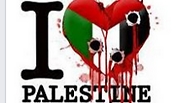
Palestinian terrorists have gone online
With little oversight, Palestinian extremists are recruiting online and publishing unfettered propaganda; the effects are already been felt on the ground in the form of a spate of recent 'lone wolf' terror attacks.
Everyone's looking for the third intifada out on the streets, but it's not only there; it has active and threatening offshoots on the Internet too.
The younger generation of Palestinians has learned well from Islamic State's staggering success when it comes to sowing the seeds of fear, and has moved the focus of its resistance to the social networks. The blogger has joined forces with the muezzin; the talkbackers are in cahoots with the stone-throwers; and the "share" buttons are working alongside the incitement leaflets.
The social network is the new mosque, and there's no need to remove one's shoes when entering; there are Border Police and there's no tear gas; and the police don't impose an age restriction on worshipers.
In recent months, this protected expanse has allowed the Palestinians to establish a new terrorist infrastructure. Instead of recruiting activists on the ground and worrying about them getting picked up on the radar of the Shin Bet security service, they've moved over to online recruitment via popular campaigns designed to sow hatred and covey the sense that the Al-Aqsa Mosque is under threat – in the hope of prompting a terror mission carried out by a lone attacker, one who is not affiliated with any terrorist organization.

Such was the case with the recent terror attacks in Jerusalem; and such was the case, too, with the death of the construction worker in Petah Tikva in September. We're no longer dealing with a wave of religious suicide attackers who are waiting to be received by 72 virgins. The new martyrs fall on the network, and get flooded with Likes.
Orit Perlov, a social media analyst at the Institute for National Security Studies (INSS) who monitors and analyzes the discourse on the social networks in Arab states, says that the Palestinian Internet is currently running a number of incitement campaigns at the same time.
"One of the leading campaigns calls for running down Jews with vehicles," Perlov says. "It uses the word, 'Idaas,' which is 'run down' in Arabic, alongside a picture of a car running down ultra-Orthodox Jews. Immediately after the shooting of Yehuda Glick, the networks began a more focused campaign that called for running down Knesset members who have encouraged pilgrimages to the Temple Mount.
"And there's also the popular 'Atan' campaign, which simply gives the instruction, 'Stab;' and there's the 'Atbah' – 'Slaughter' – campaign, in which you see a masked Palestinian youth beheading someone. And there are Palestinians who are replacing their Twitter profile picture with a picture of an ax. This doesn't mean that these people are going to go out tomorrow and take action, but that they identify with the notion and promote it."
Who posts this kind of material? Who's behind it?
"Individuals in the West Bank and East Jerusalem who understand the psychology of the Net, who know what works."
Gilad Shiloach, a network analyst who works at the American news website, Vocativ, which monitors social network activity, says that Palestinian Web users respond quickly to developments on the ground. Such was the case, for example, in the affair of the dead Egged bus driver, Yusuf al-Ramouni, who Israel determined had committed suicide, whereas his family claims he was murdered.
"Shortly after he was found hanged, activists from East Jerusalem sent out a Tweet with the heading, 'Yusuf was strangled,'" Shiloach relates. "Within a few hours, we were seeing it in the thousands. Graphic designers used Photoshop to prepare a beautiful design of Yusuf on the backdrop of the Temple Mount, with slogans like 'The Jews are sullying Al-Aqsa.' This is how a blood libel spreads on the social networks; and this happened two days before the terror attack at the synagogue in Har Nof."
Prof. Yair Amichai-Hamburger, the director of the Research Center for Internet Psychology at the Interdisciplinary Center's School of Communication in Herzliya, explains that the discourse on the Internet functions as a breeding ground for extremists.
"The Internet group is actually feeding your mind with its messages all the time, and then there's a kind of escalation," he says. "The group becomes a hotbed for an idea of a certain nature, and the individuals take it to the extreme in order to play a significant part in it. For the next terrorist, the Internet creates a media ghetto of sorts. He sees what is happening on the social networks, and it becomes his reality."
What does he experience there?
"The propaganda is absolute. We are perceived there as Satan's earthly representatives, who can take on the form of a Border Policeman, a 25-year-old woman or a baby of a few months. For him, every Jew represents a part of the threatening mechanism.
"Once the message has seeped in, the sense of solidarity becomes absolute, and the attacker's personal existence becomes meaningless. He turns into the long arm of Islam. This gives rise to a new profile of a terrorist, one who perhaps just a few days earlier had no intentions of driving his car into a group of soldiers or people at a train station, but ends up saying to hell with the world."
With its pants down
For many in Israel, up until a month or so ago, Yehuda Glick was an unknown figure; but he's been a target on the Facebook pages of Palestinian activists for the past two years. "You'll be dead soon," said the caption alongside his picture on pages that dealt with visits by Jews to the Temple Mount.
Glick complained, but nothing was done; and one Internet surfer who internalized the message eventually shot him. Today, the social networks are carrying calls for another attempt on the life of the right-wing activist.
Glick now has bodyguards, and the same goes for others associated with efforts to visit the Temple Mount and who also star on the social networks; but the big question is can the Shin Bet foil the plans of the next terrorist – a terrorist who doesn't yet know he is one.
"The defense establishment has been caught unawares by the new kind of attacker that has emerged; it's been caught with its pants down," says Prof. Amichai-Hamburger. "The thought that a regular man with a family and children might suddenly carry out an attack doesn't fit its profile."
The Palestinian masses aren't the only ones taking advantage of this security vacuum; the terror organizations, too, are entering the fray. "These organizations are using the networks to try in fact to find those who do not necessarily fit the classic profile – the introverted attacker, an individual on the margins of society," Prof. Amichai-Hamburger continues. "And it could be just about anyone from among this very large group. That's the scary thing."
Daniel Cohen, an expert in cyber terrorism at the INSS, names Hamas as one of these organizations. "The organization is trying to join the masses and to encourage the lone perpetrator by means of incitement campaigns," Cohen says.
"We're talking about popular terror attacks of sorts, ones for which the organization doesn't have to claim responsibility and have less chance of being thwarted. Once you used to be able to monitor the phone calls of activists and try to identify the individual who would be going out to perpetrate an attack; now, however, the activity has moved to the Net and is directed at the masses, and you have no way of knowing which one it will be."
According to social media analyst Perlov, "Today, all the security mechanisms have software that monitors content on the Net, so you can see if there is a mass of activity and how many people support the campaign. But there is still no computer program that can analyze sentiment – in other words, the intentions of a specific person. Furthermore, the two terrorists at the synagogue, for example, were not key figures who were active on the Net. People like that won't make an impression on the security mechanism's that are monitoring the Internet activity; they're small fry."
Despite the fact that the defense establishment has little chance of laying its hands on the lone terrorist, it still sees value in monitoring the social media sites – digging through the Facebook statuses and Twitter messages can at least offer an understanding of the mood among the Palestinians in the territories.
"There's something called 'public intelligence' – intelligence that is gathered with the purpose of studying the public," explains an Israel Defense Forces intelligence officer. "The bottom line is that we want to have our finger on the pulse of the Palestinian public; and in the age of the social media networks, you can't not add this piece of the puzzle to the picture.
"It has great value because it shows which way the wind is blowing among the public and allows you to know what pains it. 'How is the issue reflected on the Palestinian social media sites' is a question that will always be asked in the relevant forums. Sometimes, by the way, it'll be the first question."
While the IDF merely monitors the Palestinian social media sites without actually taking any action against the incitement campaigns and the like, the Palestinian Authority adopts a more active approach, shutting down Facebook pages and conducting arrests when efforts are made to organize and affect change on the ground.
"During Operation Protective Edge, for example, one of the campaigns that went viral called for the assassination of Mahmoud Abbas," Perlov says. "He was dubbed "the Zionists' dog,' 'a traitor' and 'a collaborator.'"
With attorney approval
Just in case you were wondering, Israelis are no saints either. "Only live ammunition saves lives," "Jews, revenge," "Arabs are murdering you," "Enemies aren't given jobs" – these are just a few examples from numerous incitement campaigns that have appeared in recent months on the social network sites in Israel.
The Jewish public has not sat by idly and has also reached the Internet boiling point. It happened this week with regard to the deliberations on the proposed Nationality Law, after the attacks in Jerusalem, during the 50 days of Protective Edge, and at the time of the search for the three teenagers who were abducted in Gush Etzion.
And while the Israeli public isn't swept along to the same extent as the Palestinian public, we are seeing racist and provocative campaigns on the part of right-wing groups, threats against the left, and the undermining of fundamental values of a democratic state. It turns out that this open expanse is actually closing the most mouths.
"If radical right-wing groups were once on the margins of the margins of the Israeli public, hidden deep on the Net, the opinions of such organizations today have become legitimate," Shiloach says.
"Their presence on the social networks has grown at least four to fivefold in relation to the period prior to the abduction of the boys. It was very noticeable during the war; we saw the emergence of groups such as 'I'm also in favor of death to terrorists' or 'I also support killing the Arabs of Israel.'"
One of the major sources of the fire that has spread through the Israeli social media networks is the extreme right organization, Lehava. Its principal agenda is to prevent marriages between Jewish women and Arabs; but in the wake of the recent terror attacks, it has embarked on a new campaign against the employment of Arabs. "Don't hire enemies," Benzi Gopstein, head of the organization, corrects me. "Saying 'Arabs' is racism; there are Arabs who aren't enemies and they can be employed."
In the framework of the campaign, Lehava posted an announcement with pictures from terror attacks under the slogan, "Fire tomorrow's terrorist today," and the organization has also distributed stickers bearing the slogan, "Firing the enemies."
Gopstein says they block left-wingers who curse them. "So most of the comments are positive, and some things get 80-90 thousand views," he says. "Many stores are firing their workers thanks to this. Sometimes they want us to publicize them, but not on Facebook, so as not to face legal action, so it gets around on WhatsApp. I have 60 WhatsApp groups. And there's Instagram too."
Facebook has shut down a number of your pages because of content you have posted.
"We had 40,000 members on the Lehava page; we're now at 23,000 and I assume this page will also be closed down in the next week or two," Gopstein says. "We'll open a new one. The more they torture us, the bigger we will grow.
"There are many people who sit on our page and complain about a specific picture and then Facebook takes us down. I've only been questioned about one of my posts: There was a story about Naftali Bennett saying he was in favor of bringing Arab into the hi-tech world, and I wrote that I'm in favor of sending them into the next world. But it was all in humor."
Humor?
"Like you see on comedy shows. That's what I was questioned about. I'm at the police once a week or two; we have talks; but the only connection to Facebook was about the Bennett post. I'd prefer to see them entering the world to come – not that I would put them there. Freedom of expression is very infuriating, but sometimes stands on our side. We are very careful, and every post I put up is checked by a lawyer."
Who?
"Attorney Itamar Ben-Gvir and several others. When it comes to the more problematic posts, we ask Itamar; he knows all about it."












